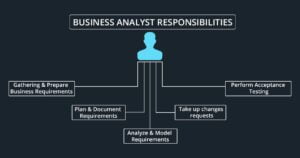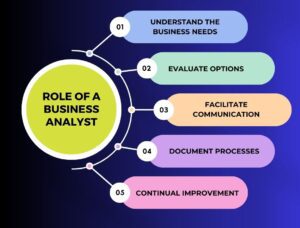Business Analyst

Business Analysts experts assist companies and groups in making their methods, services, goods, and ways of doing things better. They look at and make sense of data to come up with ideas that businesses can use to make things better. In particular, they look at issues that affect workers, customers, and management. People with business degrees can work as business analysts in many different fields. These days, a business analyst’s job is becoming more and more important. They are one of the best-paid workers in the world right now. But there are some skills you would need to become a business analyst. We’ll talk about what a business analyst does and how you can become one in this article on how to become a business analyst.
Business analysts look at data to learn about businesses and suggest changes that companies and other groups should make. Business analysts can find problems in almost any part of a company, such as its IT systems, organizational structures, or staff growth.Business analytics has become an important part of how companies work as they try to be more efficient and cut costs. Let’s look more closely at what business analysts do and search for jobs in this field.
What does a business analyst do?
Business analysts find areas of a company that can be changed to make it more efficient and its processes stronger. They often work closely with people higher up in the company to share what they’ve found and help make changes.
Some tasks and jobs are:
- Finding the organization’s functional and technical needs and standards and ranking them in order of importance
- Using SQL and Excel to look at big sets of data
- Putting together graphs, tables, and other data display tools
- Making financial models to help businesses make decisions
- Knowing the plans, goals, and needs of a business
- Enterprise design is the structure of a business.
- Making predictions, making budgets, and doing both variance analysis and financial analysis
Business Analyst: Description of the Role

Business analysts need to be able to read data and figure out how to use that information to make the business better. In particular, a business analyst is responsible for the following:
- Getting information about things that affect business.
- Looking into tools for business research.
- Talking to workers and watching the problem or process happen.
- Looking at cash information.
- Giving reports to partners.
- Looking at costs and rewards.
- Teaching workers how to do new things.
- suggesting new ways of doing things, processes, or general changes.
You can hire a business analyst to work full-time for a company or work as an independent expert for someone else. As a result, they may have several clients that need the researcher to travel and work quickly to meet all of their needs.
Why pursue a career in business analysis?
As a business analyst, you’ll have the opportunity to support your organization’s success through data-driven insights. It’s a career where every day brings new challenges and new ways to put your skills into practice. If you enjoy helping people, asking questions, solving problems, and working independently, a career as a business analyst could be a good fit.
Business analyst salary
The average salary for business analysts in December 2021 in the United States is $77,218, according to Glassdoor. Your exact salary will vary depending on the company, location, and amount of experience you have.
Job Outlook
The demand for business analysts has increased in recent years and is projected to continue. The US Bureau of Labor Statistics (BLS) projects job growth between 2020 and 2030 for similar roles to range from seven percent (computer systems analysts) to 25 percent (operations research analysts). Other related job titles include management analyst and operations analyst, both of which perform duties similar to those of business analysts.
How to become a business analyst

Becoming a business analysts may require gaining skills and credentials applicable to the work and the industry you’re interested in. Coursework, certifications, or degrees can each aid your path to a job as a business analyst.
1. Sharpen your business analyst skills.
Here are some skills you’ll typically want to have as a business analyst:
- Business sense: Knowing a lot about money, budgeting, and business will help you figure out what problems are happening and how to fix them in the best way.
- Communication: A business analyst is often expected to talk to a lot of different people in an organization, such as top management and other teams. As a business analyst, you will need to be able to easily and successfully explain your thoughts, both in writing and in person.
- Data analysis: A big part of a business analyst’s job will be collecting, keeping track of, and studying success data. It can be helpful to know how to use tools like Tableau, Excel, and BI Tools well for data analysis and display. It might also be helpful to know how to use a computer language like SQL.
- Methods for business analysis: Knowing about certain methods, such as Agile Business Analysis, Six Sigma, or Rational Unified Process, could be useful depending on your field.
- Expertise in your field: Businesses in different fields face different wants and problems. It could be different for an IT company to come up with business answers than for a healthcare company. Having experience in the field, even if it’s in a different role, can help you get hired.
2. Take a class
Employers will see that you are up-to-date on the skills they are looking for in a business analyst if you review them. That can help you get your foot in the door in the area of business analytics. You can take classes in person or online.
Take training in business analytics or data analytics to get a full picture of the job. You could also take classes in Tableau, Excel, MySQL, and MySQL to get used to the tools used in business statistics.
3. Get a certificate as a business expert.
Getting a license can help you improve your skills, which could lead to higher wages or better work opportunities.
The ECBA can show hiring managers that you’ve had a few hours of training and know the basics of business analysis if you’re a new business analyst. Three exams can show companies that you know how to do business analytics: the CBAP, the CCBA, and the PMI-PBA.
Take a look at a degree
Many companies want to see that you have at least a bachelor’s degree and some may even prefer people with a master’s degree.
Bachelor’s degrees: The BLS says that bachelor’s degrees are popular for entry-level jobs in scientific fields. It is possible to get ready for business analysis jobs by getting a bachelor’s degree in a quantitative area like finance, computer science, data science, statistics, information management, or a similar field.
Master’s degrees and MBAs: Some companies may want to hire people with a master’s degree in a related field. Perhaps you should also get a Master of Business Administration (MBA). Some MBA schools offer majors in business statistics. Getting a master’s degree in business administration or business analytics could help you learn new things, improve your skills, and give you an edge when you’re looking for a job.
5. Begin with a low-level job.
Before moving up to a higher-level job, you can get experience through internships and entry-level jobs in business, accounting, or finance. Use words like “junior business analyst” or “entry-level business analyst” to help you find a job. Meet with a job planner if you are still in school. They can help you figure out what options are available.

In what places do business analysts work?
Business analysts can work in many different fields. These are some of the most popular places where business analysts work:
- Medical care. A business analyst who works in healthcare will need to know how to run the system and come up with ways to cut down on wait times, costs, and risks for both patients and healthcare workers.
- IT stands for information technology. If a business analyst wants to work in IT, they will need to know how to use computers. They will need to know how to put raw data away, get it back, and change it.
- Money matters. Accounting business analysts will need to know how to read financial data and find ways to cut costs so that the company can make more money.
- Studying the market. As market researchers, business analysts are very useful because they can make sense of data. They can read data to figure out what’s going on in the market and make goods that people want more of.
Business experts don’t need to work in a certain field. A business analyst is useful for many companies because most of them are based on data.
Skills Required to Become a Business Analyst
To do the things listed, you need to have a wide range of expert and non-technical skills. To become a business analyst, you need to have the following skills:
1. Degree and Knowledge in the Field
You should have a degree in the subject. It also helps if you have good subject understanding and experience in the field.
2. Skill in Analysis
Business analysts need to be able to think logically and critically, as well as be good at analysis. This makes it easier to understand what the business needs and pick the best way to solve a tough business problem.
3. How to Negotiate
A business analyst needs to be able to negotiate well. As a business analyst, your job is to make the company money while keeping the client pleased.
4. Being able to use databases
A business analyst needs to know how to use SQL and linked systems. This makes it easier to get to, get back to, change, and analyze data. It is very important to know how to use Microsoft SQL Server, MySQL, Oracle DB, and SQLite.
5. Writing code
You must know how to use computer tools like R and Python. Knowing how to code can help you solve hard problems and analyze data more quickly.
6. Know-how of Data Visualization
Business analysts need to know how to use tools like Tableau, QlikView, and PowerBI to show data. This will help them make important business choices, predict data, and make reports and screens.
7. Being able to talk to people
To work with customers and other important people, a business analyst needs to be able to give good presentations and talk to people. They also need to be great at writing in order to do paperwork.

Pay for a Business Analyst
- An Indian business analyst makes more than 9 lakhs a year on average. The pay can also go up to 15 lakhs.
- In the US, a business analyst makes an average of over $94,000 a year.
CISCO, Capital One, American Express, Google, Ernst & Young Global Limited, Amazon, and Dell are just a few of the well-known companies that hire business analysts.
Are You Ready to Have Your Own Business?
You’re ready to start your job as a business analyst now that you know what a business analyst does, who they work for, and how to become one. Check out and sign up for our newest program, Post Graduate Program in Business Analysis, if you want to learn how to be a good business analyst. Move up in your job right now! Move up in your job right now! Don’t miss this opportunity to gain the skills and knowledge needed to excel as a business analyst. Don’t miss this opportunity to gain the skills and knowledge needed to excel as a business analyst and advance your career.
Business Analyst Roles
- Data Analyst
- Functional Analyst
- Quantitative Analyst
- Research Analyst
- Systems Analyst
- Enterprise Architect
- Process Architect
- Business Solution Architect
- IT Project Coordinator
- IT Lead
- Process Coordinator
- Management Consultant
- Product Manager
- Project Manager
- Compliance Manager
- Chief Information Officer

What do you need to get a job as a business analyst?
Being a Business Analyst may be hard to do if you don’t have any college degrees, but you don’t officially need any to be one.
Should you want to become a business analyst, it could be helpful to have a bachelor’s degree in a similar area, such as
- Management of business
- Science of computers
- Keeping books
- Analysis of finances
- Business architecture
- Science of data
- Systems for information
- Management of operations
- How things work
- People resources. The Truth
What to do after this
If you’re interested in a job in business research, you should first look into ways to improve your skills. You can learn a lot about the field by taking classes in business systems or business analytics.
 Data Science in Digital Marketing Data Science in Digital Marketing: Mechanism Examples, Benefits Data Science Meets Digital Marketing Magic
Data Science in Digital Marketing Data Science in Digital Marketing: Mechanism Examples, Benefits Data Science Meets Digital Marketing Magic
